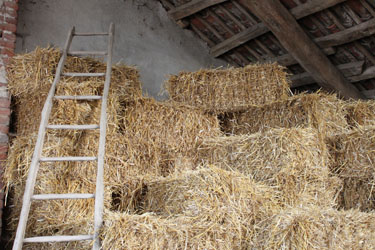Veterinarian Tips: Barn Safety

Most farm clients enjoy working in the barn and spending time with their livestock. While this life does offer many types of rewarding experiences, it can also be dangerous. Barn safety is key to maintaining the satisfaction of being a farmer!
Are your farm clients aware of the danger in their barns? The following safety tips will help to identify potential problems that could turn a barn into a potentially dangerous environment.
Tip #1. Electrical Issues
One of the leading causes of barn fires, electrical problems often occur when the need for electricity surpasses the ability of the service. Electrical issues often arise from conditions involving:
- Antiquated fuse boxes
- Ungrounded outlets or electrical system
- Old wiring that predates three-prong outlets
- Wiring that has been damaged from impact or rodents or has become frayed with exposed wires
- Device connections that are exposed or wrapped in tape
- Loose wires that are hanging overhead or have been placed underground without protection.
These types of problems are commonly found in older barns and require immediate attention.
Tip #2. Lighting
Good lighting is essential. A well-lit barn helps those working in the barn to see, reducing the chance for accidents.
- Fixtures need to be strategically mounted in locations that keep them out of an animal’s reach, yet placed in areas that provide for optimal visual needs
- Lighting fixtures also need to be conveniently accessible to ease the changing of burned-out bulbs.
Tip #3. Fire Safety
Fire extinguishers should be readily accessible within any barn. Suggest to clients that they choose portable, multi-purpose ABC type of fire extinguishers which use a dry chemical called monoammonium phosphate. ABC extinguishers put out three classes of fire:
- Class A: trash, wood, paper
- Class B: liquids, gases
- Class C: Energized electrical sources
Extinguishers should be easily reached and in visible locations, such as at all entry/exit doors, placed no more than 50 feet apart, and checked annually to determine if they’re charged. If the test shows it’s not fully charged or the extinguisher has been used, make sure to recharge it.
Smoke detectors are also recommended for barn use. However, clients need to be advised that normal residential detectors may not be as effective because the dust found in a barn will clog internal mechanisms.
Tip #4. Hay Storage
If hay is to be stored in the barn, it is important to carefully consider the options. Fresh hay bales generate high levels of heat until the curing process is complete, and even after the bales have cured, the hay remains highly flammable.
Clients should consider the following practices when hay must be stored within the animal barn:
- Avoid baling hay when the moisture content is greater than 16.5%
- Place hay in a well-ventilated area that will allow the heat to dissipate as it cures
- Stack bales loosely in a way that leaves the sides open and allows for an air space between bales
- Lay bales on their side to allow for the air to move up and out of the bale
- Stacking green bales loosely will help the hay to cool and cure and may also prevent mildew formation
- Make a practice of measuring the heat of the bales for a few weeks until the curing is complete by inserting a temperature probe into the center of the individual bales. Bales that are 150 degrees will usually continue to rise in temperature. Bales that reach 175 to 190 degrees are going to burst into flame, and the fire department should be contacted.
Additional client suggestions include:
- Always keep the hay storage area clean
- Institute a “No Smoking” policy
- To remove the chance of a fire caused by an electrical spark, minimize the use of electrical devices near hay storage areas and never leave radios or appliances plugged in when leaving the barn
- When stacked, make sure the hay will not tumble over onto workers or animals.
Tip #5. Equipment Storage
Pay close attention to the types of items being stowed within the barn. Items that are highly flammable or that emit fumes should never be kept in the same buildings where animals are raised. Avoid, for instance, storing the following:
- Fuel
- Paint
- Pesticides
- Herbicides
- Fertilizer
- Machinery with engines and batteries.
Offer these helpful tips to prevent your farm clients from becoming injured.
Covetrus Help
Covetrus not only offers products for your veterinary practice, we offer webinars, blogs, and practice management guidance for free on our website.
Our blogs not only present advice of value to you and your staff, we offer information you can pass on to your clients, whether they are horse or small pet owners or clients involved with dairies and herd animals.
Your Covetrus representative can provide other tips and suggestions of value to you and your clients! Contact us at: 855.724.3461 or online.
Sources:
http://equimed.com/health-centers/healthy-barn/articles/avoiding-barn-related-injuries
Careers
Are you looking for a place to let your talents shine? At Covetrus, we help our practitioner customers better serve their patients and take pride in providing the best customer experience possible. Search our open positions to see our available opportunities.
Newsletter
Stay current with what’s going on with Covetrus, subscribe to receive our newsletter and email communications. Subscribers will receive the latest information in practice management, sales and marketing, animal health, and more.


Leave a comment